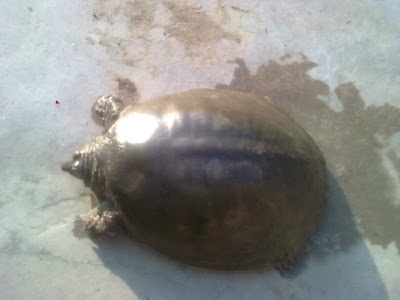Care of Indian black Turtle (Melanochelys Trijuga):
It is a medium sized fresh water turtle. despite its name the color of its upper shell or carapace varies largely from reddish to dark brown and black with yellow streaks running along its length.the underside, plastron is uniformly brown in color. The face of this turtle may have yellow or orange marks and spots with the color of these marks varying form 1 sub species to another. it has 6 identified sub species in the Asian region, each having somewhat different pattern of spots on head. Size may vary from 38 -45 cm in length. there is not much information available for this species online but I will try to combine whatever I have experienced with this species and what I found on internet.
Enclosure:
For a basic idea for its enclosure when keeping it as pet please refer to the sketch below. It gives all the basic requirements for keeping a turtle. In a tank you will need substrate, a good filtration system( canister system is best), water heater if you live in cold area, platform for basking, and basking light. Decorations are additional and depends on your choice, just make sure that they don't hurt the turtle with any sharp edges. If you have a pond then its all the better. It likes slow flowing water with sand substrate or in outside settings a pond with mud substrate is best according to my experience.
Diet:
It is omnivorous, means it eats everything ranging from aquatic vegetation (you can acquire from the local fish shops in cheap rates or collect yourself from nearby ponds and streams) to fishes, snails and aquatic insects. I used to go to a nearby river and catch some insects from the water and bring them for him so that he can feed on them like live natural food along with occasional feeder fish and since I had brought mine when it was small so i also acclimatized him with artificial food.It is most active during early morning and evening time.
Breeding:
The images are taken from http://www.arkive.org/indian-black-turtle/melanochelys-trijuga/image-G89324.html .
 |
| from the under side |
 |
 |
| from the upper side |
By: Dr. Siddharth Mishra
Disclaimer: The medicines/ treatment and methods of taking care of the turtle/tortoise described here are in no way perfect on their own and patented by the author, they are the result of collective experiences of the author and his readings and by his associations to other keepers and should not be used as an alternative to Professional Vetrinarian advice, Readers should use their discretion when using the medicines and/or care sheet described here, the authors can't be held responsible for any damage, loss, side effect or death of any animal / pet due to negligence of the keeper or the caretaker using any of the above methodologies and treatments.
The images displayed from other sources are the property of their owners and the author no way claims ownership over images from other sources, Original images are the work of author and should be treated as author's property when using for reference or any other miscellaneous use
The images displayed from other sources are the property of their owners and the author no way claims ownership over images from other sources, Original images are the work of author and should be treated as author's property when using for reference or any other miscellaneous use






what to do if it does not eat at all during summer days?
ReplyDeleteHe deserves to be in a pressure cooker then
ReplyDeleteu deserve to be in a pressure cooker fool
DeleteWhat type of foods
ReplyDeleteCarrots grapes banana palak cabbage prawns dry fish chicken liver
DeleteYou have copied pasted Wikipedia. Good work. Atleast reply to people asking questions
ReplyDeleteI have baby Indian black turtle I buy defferent type company of food to give her because nowadays she don't eat only hiding in a cool & dark place & sleeping 😭
DeleteYou have copied pasted Wikipedia. Good work. Atleast reply to people asking questions
ReplyDeleteHow often should I give my turtle food
ReplyDeletedont give food
DeleteWhat to feed the black turtle, please let me know clearly
ReplyDeleteIn addition to these, pet stores can also provide pet owners with the best tools that can help them take care of their pets. dog toys
ReplyDelete